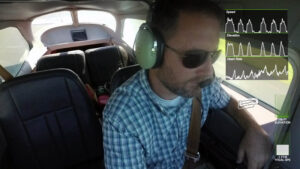Human performance scientist and pilot-in-training Dr. Ronald Storm’s theories are proving to be true.
“It’s pretty easy to tell which three landings were done with my CFI and which were done solo,” he said about the results of data he collected throughout his flight training experience both in the Gleim Virtual Cockpit simulator and in the air.

“My heart rate (HR) was 20 to 30 beats higher than average when I soloed,” said Storm, whose theory suggests that the more student pilots train with a simulator, the more comfortable they will feel during a lesson in actual flight, and that comfort will translate into a deeper learning experience.
Storm has been collecting HR data on himself as he navigates the Gleim X-Plane Flight Training Course and as he takes live flying lessons. He is starting to expand his data collection to other pilots in training. In June, Storm decided to first conduct the study by measuring his own heart rate variability (HRV) as a predictor of both physiological and cognitive success. “I keep seeing the same patterns,” Storm said about his initial results. “Every time I learn a new skill, my HR is high until I start to become comfortable.”
According to Gleim Aviation Instructor Paul Duty, the simulator course mirrors the Gleim FAA-approved Private Pilot Syllabus. Students can practice each lesson on their personal computers before flying in the real plane with their instructor. “Knowing what to expect before a lesson helps students become more ready to learn so they can retain more from each lesson,” Duty said.
Storm said he agrees and is trying to prove his theory in his research project. “I’m going to analyze all of my flights to date and create some graphs showing the changes over time,” he said. “Everything’s starting to add up.”
Storm said the data he collected pre-solo flight was “interesting.” “In my early days of flying, my HR was very high.” After he soloed, he said “It then became very low, lower than expected.”
Storm said when his flight instructor asked him if he was ready to fly solo, his HR spiked. “But on the day of my solo, my HR was what it normally is. Then I did my solo and it was up 40 beats higher.”
Storm said he will continue to use the simulator and the Gleim X-Plane Flight Training Course for his cross-country training. “That will get me comfortable with cross-country flights,” he said, “That’s my next evolution.”
“I’ve been using the Gleim Virtual Cockpit simulator and it’s working really well. It helps with understanding flight controls, procedures, all that was important. The three screens helped me get landings down pat,” he added. “Whenever I have a break and can’t fly for a few days, sitting back down and flying with the simulator gets me re-accustomed.”
Now Storm is trying experiments that involve the unknown. For example, his CFI will tell him only one of the two airports he will be landing in. “When we get ready to practice, I can practice landing at one airport, not the other. Then I’ll test the difference in my HR and compare between the two.”
Storm is essentially studying the known versus the unknown and how his body and mind respond to situations that his mind says he is ready for, but his biometrics possibly reveal otherwise. “The feeling of being prepared plays a key role in how HR registers,” Storm said. “Data is indicating that sim systems are qualitative, making me feel better when I fly.”
This preliminary data clearly shows that practice using a flight simulator and the Gleim X-Plane Flight Training Course is helping Storm learn how to fly, retain lesson material, and feel more confident in the cockpit.
About Gleim Aviation
Since 1980, Gleim Aviation’s team of pilots, instructors, writers, designers, and programmers has helped aviators pass millions of FAA knowledge and practical tests using the unique Gleim Knowledge Transfer System. Gleim is an environmentally friendly company headquartered in Gainesville, FL. Learn more at www.GleimAviation.com or call (800) 874-5346 ext. 471.

